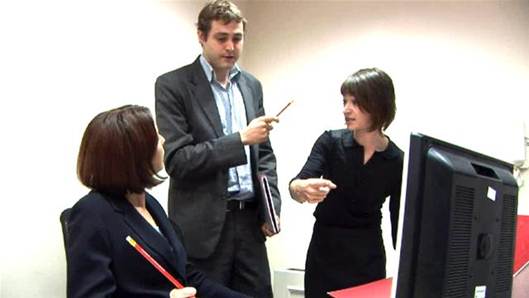Use our 21-step guide to increase your
get-up-and-go!
With juggling work and family
responsibilities 24/7, and having to process endless information, it’s no
wonder we’re a generation that’s completely over-whelmed and exhausted.

Triple
your energy in just three weeks.
But let’s consider the alternative: waling
up with a passion for life and living it every single day. With our 21-day
programme, that energy can be yours. In just three weeks, you’ll master the
fundamentals of getting fired up: reducing stress, eating right and optimising
exercise. So don’t just sir there. It’s time to banish fatigue!
Week1/Squelch stress
We’re perpetually under pressure and our
fight-or-flight response gets stuck in “on” mode. Talk about exhausting!
“Most of our stress occurs when we feel
overwhelmed, unable to cope or aren’t in control of a situation,” says Shelton
Kartun, a stress counselor and CEO of The Anger & Stress Management Center
of SA. “Financial strain, traffic, job insecurity, demanding children, ageing
parents, difficult people, moving home and relationship problems are all major
stressors.”
The good news is you can reverse the cycle:
not by eliminating stress, but by becoming more resilient in the face of it.
That’s your focus for the next seven days.

Not
by eliminating stress, but by becoming more resilient in the face of it.
Day 1: Attack your angst

Can
you delegate some duties?
Research shows that people who process
negative experiences on paper are healthier than those who simply ruminate.
“Studies show that when individuals write
about emotional experiences, significant physical and mental health
improvements follow,” says James Pennebaker, author of “Writing About Emotional
Experiences as a Therapeutic Process” in the journal Psychological Science.
So get a diary and write down anything
that’s bothering you. Then brainstorm ways to improve issues within your
control. If money’s a problem, can you refinance debts or slash expenses? If
work’s overwhelming you, can you delegate some duties? In the case of family
troubles, would you consider therapy?
Next, write down things you’re grateful
for. Studies reveal that taking stock of the positives lifts energy levels.
Day 2: Soothe the symptoms

Soothe
the symptoms
“There are many stress-related signs. They
may be headaches, lack of concentration, high blood pressure, decreased
immunity, low libido, irritability, anxiety and insomnia,” says Kartun.
Notice how your body responds to angst
(when you take on a task and get a headache, for example) and learn how to
manage it. For particularly painful or persistent problems, talk to your doctor
or try a programme like mindfulness-based stress reduction
Day 3: Check your bed
“Sleep deprivation can cause health
problems, including depleted energy levels. Most people need seven to nine
hours of shuteye a night but aren’t getting that,” says Dr Susan Musikanth, a
Cape Town counseling psychologist. Common issues include an uncomfortable
environment and multiple interruptions (from partners and pets to allergies and
anxiety).

Check
your bed
For a more restorative night’s rest, try
proven strategies, like going to bed and waking up at the same times (even on
weekends); making the bedroom dark (try using a sleep mask); limiting caffeine
intake; and avoiding stressful evening activities (no horro films or midnight
home-budget balancing!)
Day 4: Log off
Information overload and the pressure to
instantly respond to calls, emails and texts has led to a self-imposed
teachno-stress.
“We don’t allow ourselves to switch off but
seem to want to be on-call 24/7. Now there are iPads and tablets and social
media updates on facebook and Twitter. So we don’t stop and can even become
addicted to all of this, which inspires a kind of exhaustion,” says Kartun.

Turn
off your cellphone and shut down your email.
He suggests that you limit yourself. “Do
other things, like exercise. Take five-minute breaks on the hour to step away
from your computer. Turn off your cellphone and shut down your email.”
Day 5: Breathe out
Relaxing breath is a powerful way to create
a calm and alert state of mind, comments Brian Bergman, a cape Town-based yoga
and meditation. “It’s an effortless technique and that’s why it’s relaxing. We
breathe all the time. A practice of simply observing this thing that is going
on anyway requires no effort,” he says.

Breathe
out
To do it: breathe in through the nose to a
count of four, hold for one second, then exhale through the mouth to a count of
five. Repeat four times morning and night for calm and steady energy.
Day 6: Set limits
When was the last time you said “no” to
something? “Don’t allow others to take advantage of you. Set boundaries and
make sure people know not to overstep them,” advises Kartun.
This is especially relevant with “energy
vampires”, like complainers. When you encounter “soul-suckers”, instead of
wasting energy nodding in agreement, say, “I can’t talk right now, I’m
eating/tired/busy.” You’ll feel lighter when you do.
Day 7: Be a giver
Being charitable packs potent emotional
benefits. “Enjoyment, instant gratification, empowerment, inspiration – all of
these sentiments are powerful emotional incentives,” write Daniel Oppenheimer
and Christopher Olivola, authors of The science of Giving (Psychology Press).
Try matching your skills with others’ needs
through websites like sister.org.za, charitysa.co.za or pets.org.za. Turning
your compassion into action could light an nner fire you didn’t know you had.